- Home
- Peter Carey
A Long Way From Home Page 28
A Long Way From Home Read online
Page 28
‘You’re a little bit pissed,’ she said gently, ‘but you can save a baby. Barry, please.’
‘Suit yourself,’ he said. What an odd choice of words, I thought, from a station boss to a camp girl. He dug into his pocket and then stumbled across the room to that mess he called his office. Here he fiddled with a filing cabinet, from which he finally extracted a single key ring which he dangled before my surprising pupil.
‘But don’t you make assumptions, girlie.’
‘Thank you,’ she said.
‘You understand what I am saying?’
‘Yes.’
‘You’ve got a real future, Susie,’ he said, and flung the key out into the night.
19
In the moonless dark, between the sick baby and the tiny hospital, lay the engorged Mardowarra River with its brown skirts frothing against the upstream edge of the old Two Mile bridge. Of course the baby’s parents must risk this crossing. So must I. But there was no reason for a schoolgirl to venture out onto a structure that might be swept away at any moment. I told her to get out, I would pick her up on my return.
The Peugeot smelled of damp and mould and rotting rags. I took a breath, and engaged low gear. If my headlights and my eyes were full of rain I could still make out the luminous figure of that wilful girl walking backwards on the bridge, gesturing that she would guide me. The bridge, being always temporary, had no parapet but of course my sturdy student had lived through many wet seasons and must be familiar with situations just like this. I told myself, Willie, there is only an inch or two of water. Do not be a Southern Wonder.
Of the baby whose life we were intent on saving I honestly have no memory, only of the ghost girl in my headlights and my fear she would be swept away.
The current was strong. The water surged upwards on her shins. A floating log slammed against the rear and the back wheel shifted. The mother was behind me, speaking rapidly in her tongue.
I clamped myself around the steering wheel and dared not shift my eyes until, at last, the front tyres were churning, and the object of my attention was scrambling up the track ahead.
I have only the vaguest recollection of the dark hospital and then the ferocious camp dogs who attacked me as I tried to find a nurse. I suppose I was drunk on adrenalin. I remember no particular satisfaction when the child was in safe hands. As far as I knew we did not have to risk the bridge again. I could have stayed there for a week (more likely two) until the flood subsided, and when I was back looking out across the flooded bridge again, this really seemed the wisest thing to do. But my passenger had her own private motivations.
‘Hang on, boss,’ said the sneaky clever child as she got out of the car and shut the door behind her.
I was the teacher, she the pupil, but it was her country. I mean, it was not insane to trust her judgement that she might lead the way across. To me, the river seemed a different beast since last we crossed. Not only had the water risen, but there was more debris which now jacked the tyres, just a little, an inch or less, but sufficient to lose a percentage of traction and permit the water to get a better hold of me. In midstream, the edge of the bridge was not even visible and I was steering against the current, feeling how the Peugeot wished to float.
The girl took two careless stumbling steps and I thought she was gone but she recovered and from that point there was no option for either of us but to inch towards the shore. She tripped a second time and I thought her lost but then she grabbed the bumper bar and, as I watched, climbed like a river creature onto the steaming hood.
Then my tyres were spinning in the welcome mud and I saw her marvellous white teeth laughing and she crawled across directly through the absent windscreen and her clothes were drenched and pasted to her, like clay slip in a sculptor’s studio.
She rolled forward into the passenger seat and poured water from her sandshoes out her window and I thought, one day, Susie Shuttle, you will be an important woman.
But then I was back at Quamby Downs and what had become my ‘normal’ life.
My first business was with the Punka Wallah who I found sitting on a kerosene drum on the wrong side of my gate. At this early hour he should have been at work in the laundry, but Carter was away dealing with a broken windmill and my visitor had planted himself fearlessly at my gate. He faced my front door, knees close to the offensively named ‘boy wire’. Why he was waiting for me he wouldn’t say and, being the Punka Wallah, he was bad tempered because I could not read his mind. Would he like a cuppa? No he wouldn’t. He rested a poor fragile leg across a knee, and I saw his starving childhood and was now alert to the scars across those barky shins.
When it was time for class I bade him farewell. He was still at his post at lunchtime, joined by curly headed Crowbar who was a distinct contrast to his wound up friend. Yes Bill, certainly, he would like a cuppa.
I returned with the tea things, and saw the kerosene drum had been placed in such a way that it became a table and I was provided with delicate shade from a half dead poinciana sapling.
My visitors each took a staggering amount of sugar which I was no longer shocked by, and there then followed one of those companionable silences I had come to know at Quamby Downs.
‘Good car, eh?’ Crowbar grinned at last, and I thought, of course he knows we drove across the flooded bridge last night.
Nearby, the Peugeot steamed like a bucket of old rags. ‘Good car,’ I said.
He arranged his hat. ‘Electrics OK, no worries.’
‘Thank you.’
Crowbar pushed his brim back and explained what he had done to waterproof the electrics. This technical chatter was very welcome to me, but not tolerable to the Punka Wallah who spiked it with sarcastic-sounding commentary until – suddenly – he threw his unfinished tea onto the dirt. He stared fixedly away from me. He spat. He began a long belligerent complaint, then stopped abruptly.
Crowbar sipped his tea with his habitual equanimity.
The Punka Wallah’s voice now entered a new high register and when he had reached the true climax of his indignation, he spat a second time.
OK. The quiet returned, I asked Crowbar what I had done to offend his mate.
He drew something in the dirt and flicked it away with his long fingers. He explained that Tommy had given me a gift of petrol. The Punka Wallah nodded and curled his long black hair around his fingers and knotted it and I looked into his yellow whites.
Crowbar translated. It was a present, he said. Now I had used it up. If I was a true blackfellah I would know what was expected of me.
I explained we had to save the baby’s life.
The Punka Wallah understood me perfectly. ‘Bullshit,’ he said, ‘I give you. You give me.’
After some consideration he added: ‘Baby bullshit.’
I placed my hand on my heart and said I would repay the gift.
He said he was giving me a chance no-one else would, not Lochy, no-one. He could make me a proper blackfellah. He would teach me how. Without this, I would be alone. No-one would want to marry me. No-one would like my kids. On the ark I could have many wives.
It would be difficult to exaggerate how fiercely this pressed hard on the raw nerve of my life, the midnight fear I would always be from nowhere. How lonely and exhausting it was to live inside my skin, to spend my nights gluing the pressed plants into a big notebook, transcribing the names my class had taught me, to wake each morning frayed, disconnected and know I did not belong.
I said I understood the value of what he was offering.
He leaped to his feet. He spat. He walked away. Then, as I had seen a man in the camp return to the source of his offence, declaring outrage, shaking a stick, or an axe, appealing to the witnesses to judge his case, he came running back at me and stopped a foot away.
Then all the hard features softened and the eyes were wet. He would siphon more juice and bring it to me. He would save a place for me on his secret ark. He spoke in English, very clearly. I could bring plenty books, too
much peipa, from Sydney, Big London, what I wished. Plenty jewels and crystals on that ark already.
I could bring more stuff from inside my house here. There was room for a wireless, kero fridge. If I did not bring these things they would all be washed away, my whole residence, Carter’s Big House too.
I thanked him.
But did I understand what he was giving me?
I thought so.
Then he would tell me once again. Carter, Carter’s kids, jackaroos, policemen, Welfare, all the kartiya would drown. Christmas trees would catch on fire. Anytime now, he said, and I imagined blazing Christmas trees ascending, swallowed by the clouds.
It was important that I listened to him. But it was essential I be in class. In making my excuses I was clumsy. I pointed to the sky. No rain, I said. All gone. I smiled, meaning we could discuss the apocalypse on another day.
‘No rain bullshit,’ Tom the Tailor cried in perfect convent English. ‘Gone. Ha!’ he shouted. ‘Ha! Ha!’ He turned towards the camp and then came back. He ripped a branch from the poinciana and looked like he would whip me with it. Instead he stamped on it and trampled it down into the mud. ‘You wait. You see. Big rain. That girl, she be washed away.’
‘What girl?’
‘That wife you got. She bin finished now. Old Cricket got her in the house. They drown inside his bloody bed.’
To pay him back I asked him what about the bloody car, would that be washed away as well?
‘You cunt,’ he said to me and I saw his coated tongue, like a cockatoo’s in his dark mouth. ‘Poor stupid fellow, you. Better lock that door tonight.’
Tom Tailor had always walked faster than was quite normal and now he scurried along the side wall of my residence and disappeared from view.
I asked Crowbar was it possible that the Punka Wallah had just threatened to sing me to death.
Crowbar produced a roll of chewed up stinky tobacco. He said a black man could only sing a black man. He selected a choice piece of baccy and placed it delicately inside his cheek. He said that if a white man could be sung they could be killed, so many kartiya been killed long time ago, Carter for instance. Big Kev Little would have his kidney fat all stolen, his insides filled with snakes and crystals.
But had he forgotten I was a blackfellah?
Ah yes, he said. He looked away from me, out to the eastern horizon where soft cumulus clouds were massing once again.
‘Maybe you go with him,’ he said. ‘He teach you Law a little bit.’
‘Gammon Law,’ I said.
This was to claim more knowledge than I had.
‘Safer you be mates with him Bill.’
Of course I did not wish to face whatever dangers would be involved in becoming the pariah’s follower, but nor did I wish such a fierce fellow to become my enemy. For this reason I soon paid the Punka Wallah a visit, crawling on my hands and knees through the tiny door, bringing a tribute of tea and sugar. I expected to be offered tea. None came. Then – what choice did I have? – I said I would drive him to his ark.
He accepted but I saw no cuppa was forthcoming.
I returned to the teacher’s residence and wondered when that petrol might arrive and who would bring it and who I might offend but all of these complicated anxieties were soon forgotten when my final visitor brought, not petrol, but her glowering daughter, Susie Shuttle.
Only now did I learn that Susie had a chance to be accepted at the Perth nursing college and her mother had insisted that she have Cricket Carter write the reference letter. Carter had been very keen to oblige. He had employed Susie on the spot, as a house girl for after school.
I thought, how disastrous, but then again I saw the mother’s point of view. A teacher was a weak and useless thing but now, when the boss had not delivered, I was her only hope. Mr Carter had the papers. They were sitting on his desk.
How could I not offer my assistance?
20
An explosive incident like the one with Bennett Ash was the exception to the rule. I did not usually lose my temper. I had been, if anything, too much the other way. For instance, when called a kraut in Bacchus Marsh I remained my good natured self, waiting a decent interval before sustaining an ‘injury’ that would let me leave the football team without offence. That was my social habit or disability. So I went to visit Carter that evening completely sure that we would conclude our negotiation amicably.
I dozed while I waited for him to return from his day’s work and it was late when the lights of the Chev truck swept across my bedroom wall and I heard the workers’ soft voices as they drifted back towards their camp.
I left him plenty of time to clean up and was surprised, on finally entering the Big House, to pass the filthy cake of Lifebuoy in the basin and discover, in the hiss and glare of the kerosene lamp, the boss alone at the table eating tuna from a can. His desolate face was smeared with grease, and his rum bottle was wet with soap and engine oil. Above all this the punka swung, and the tepid air moved back and forth. In the no-man’s land between dark and light I found Tom Tailor’s eyes.
Carter was already speaking as I entered.
‘My old man,’ said Carter, ‘was a mechanic in Warracknabeal.
I thought I was getting away from all the grease monkeys when I went on the land.’ It was only then he spotted me. ‘Look,’ he said and held his dripping hands up to the light. ‘Windmills. Bloody windmills, mate. Did you know Inigo Jones died?’
Inigo Jones, of course, was the most famous long term weather forecaster in Australia.
‘Jupiter,’ he said. ‘Saturn, Neptune and Uranus. Your anus,’ he said.’ Jesus Bill take a joke.
He wanted me to sit. I sat. He slid his tuna can towards me.
‘God I miss them,’ he said. ‘I should have gone home for Christmas while I could.’ He drank. ‘Giddy up,’ he said and I thought him impatient for me to eat the oily fish but he was looking at the punka above his head.
He twisted in his vast pearly chair to address Tom Tailor who was standing behind his shoulder pulling on the rope. The Punka Wallah raised his chin and I saw his eyes much narrowed as his speed increased and I thought how much he must loathe the station boss. Did he nod to me? It’s possible.
Carter, meanwhile, knocked his glass but managed not to spill it. Of course I should have returned to my bed but as it was obvious that he was in no state to write a reference, I imagined he might be pleased to have me perform that labour for him.
Was I not aware that he had already formed an unsuitable alliance with my pupil? Yes. Did I understand he would not wish to let her go? Yes, yes, and yes. Then why on earth did I choose this moment to tell him that I had received a letter from the nursing college?
‘No you didn’t,’ he said.
‘They wrote to me,’ I said although I was unschooled in lying, already beyond my limits.
‘If they’d written to you, bozo, I would have seen the bloody letter.’
I said he must have overlooked it. They had written to me only because they had not yet received a reference for Susie Shuttle. He was laughing now and I was already tangled, knocking over my pieces on the board while he played his own loose anarchic game where everything could jump three squares at once.
‘There’s not a letter comes in or out of Quamby Downs without me knowing. Of course they never wrote to you. They never heard of you, you little needle dick. I know what you’re up to.’
So I had made a muddle of it, although this had the curious effect of making Carter happy. Indeed he began to sing ‘Late Night Susie’ which was on the hit parade that year.
What you gonna tell your mother?
What your daddy’s going to say
About your stocking ladders
Now the milkman been and gone.
It was not the tunelessness that made it awful, but the lascivious lips, the clear claim to carnal knowledge of a child in his employ.
A flood of bile rushed through my cells. I beheld the creature on his filthy pearly thr
one and could have killed him.
‘You’ve come to make sure little Susie gets her reference. That’s it?’
‘I could write it if you’re busy.’
‘Good man,’ he cried, rising from his seat and lurching towards his pigpen desk, leaving me to confront his vacant throne and its back support, a kind of escutcheon, where I made out the crude fretsawed likeness of a crab.
He knocked a weight from his desk.
‘Help your bloody self,’ he said. ‘Sit back down. Relax.’
He thrust a letter in my hand and I thought, I’ve won. But it was the request for a reference, nothing more.
‘You think I’m a mug?’ He was too much behind me, hovering.
‘Never.’
‘She’s a great root, mate. Do you think I’m stupid?’
The etymology of root is in rut, from Old French, meaning ‘noise, roar, bellowing’ which, even after it has entered the Australian language, still summons up visions of raw sexual congress.
‘A lovely juicy little root,’ he said and thus condemned himself.
I asked him how long he’d had the request in his hand.
Since the mail before last he supposed. The wet season had held up the last two deliveries.
There was someone lurking in the kitchen hut. The punka rode back and forth. Carter continued to stand behind me, shifting whenever I turned.
‘I could write it for you,’ I suggested, ‘and bring it in for signature in the morning.’
‘Oh, you could bring it to me, could you? Have you lost your marbles too?’
‘Just trying to help.’
‘It’s called a psychotic breakdown. Just comes on you, out of nowhere.’
‘Why don’t we sit down?’
‘Why don’t you back off? You lay a hand on her again, I’ll fucking drop you.’
‘Barry, you’ve got it wrong.’
‘Mr Carter to you.’
‘Mr Carter.’
‘She doesn’t want to be a fucking nurse. She’s got a job at Quamby Downs. Why would she need another one?’
Finally, there he was, where I could see him. I was sickened by the pasty glow of his skin, the gut above his belt, the corruption of his body, but still I was in perfect control of myself. Even when he crumpled the letter I kept my cool.

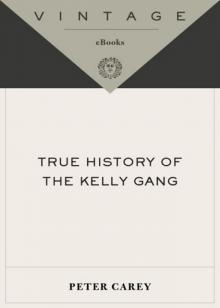 True History of the Kelly Gang
True History of the Kelly Gang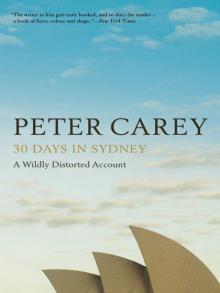 30 Days in Sydney: A Wildly Distorted Account
30 Days in Sydney: A Wildly Distorted Account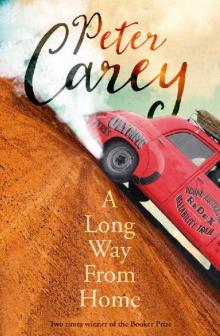 A Long Way From Home
A Long Way From Home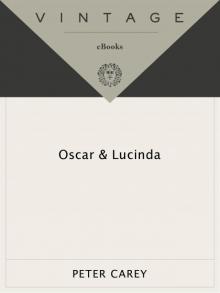 Oscar and Lucinda
Oscar and Lucinda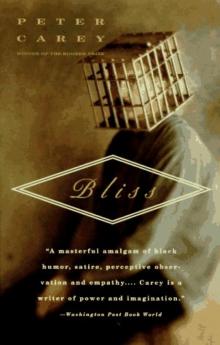 Bliss
Bliss Wrong About Japan
Wrong About Japan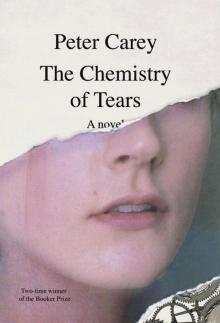 The Chemistry of Tears
The Chemistry of Tears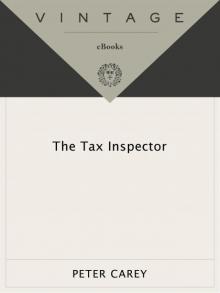 The Tax Inspector
The Tax Inspector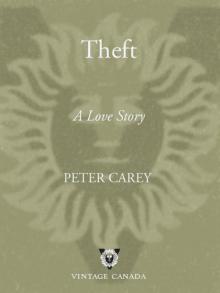 Theft: A Love Story
Theft: A Love Story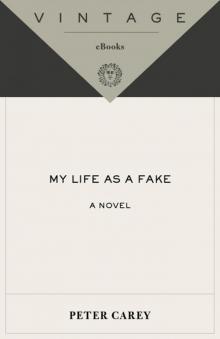 My Life as a Fake
My Life as a Fake Collected Stories
Collected Stories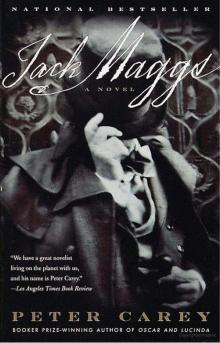 Jack Maggs
Jack Maggs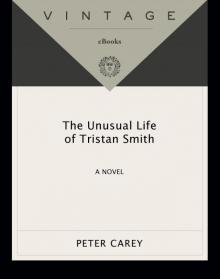 The Unusual Life of Tristan Smith
The Unusual Life of Tristan Smith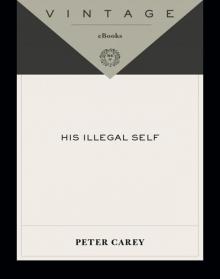 His Illegal Self His Illegal Self His Illegal Self
His Illegal Self His Illegal Self His Illegal Self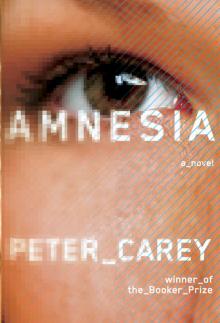 Amnesia: A Novel
Amnesia: A Novel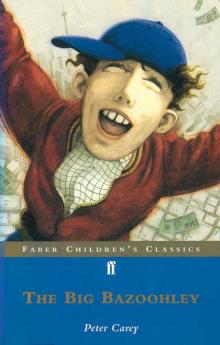 The Big Bazoohley
The Big Bazoohley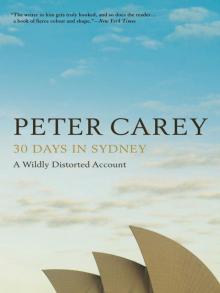 30 Days in Sydney
30 Days in Sydney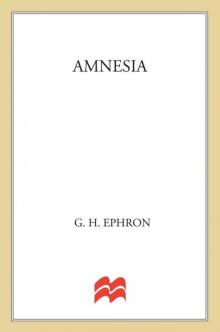 Amnesia
Amnesia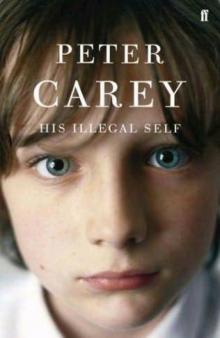 His Illegal Self
His Illegal Self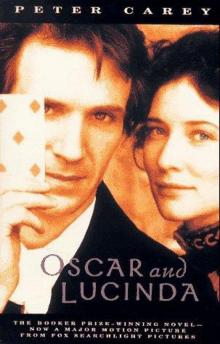 Oscar and Lucinda bw-1988
Oscar and Lucinda bw-1988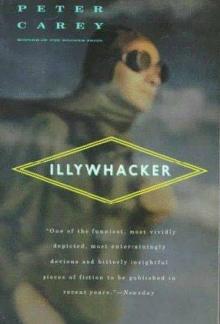 Illywhacker
Illywhacker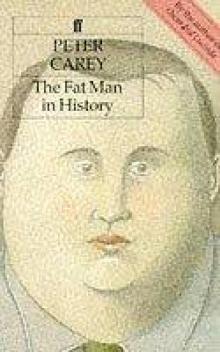 The Fat Man in History aka Exotic Pleasures
The Fat Man in History aka Exotic Pleasures